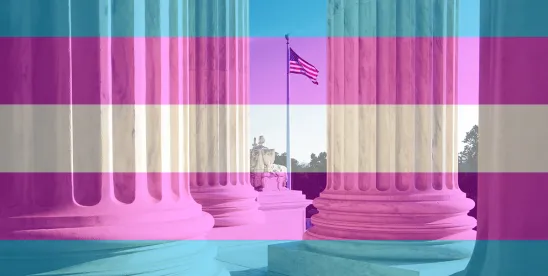On June 18, 2025, in the case of United States v. Skrmetti, the Supreme Court of the United States (SCOTUS) upheld Tennessee’s ban on gender-affirming care for minors, concluding that the law (titled Prohibition on Medical Procedures Performed on Minors Related to Sexual Identity, Senate Bill 1 (SB1)) does not violate the Equal Protection Clause of the Fourteenth Amendment of the U.S. Constitution.
In a 6-3 opinion authored by Chief Justice Roberts, the Court affirmed the decision from the 6th Circuit Court of Appeals, which held that under the rational basis review, SB1 does not discriminate on the basis of sex for purposes of equal protection. Employers should be aware of certain considerations following this decision.
What Skrmetti Made Clear
In its decision, SCOTUS concluded that SB1 incorporates only two classifications: (1) age (allowing certain medical treatments for adults but not minors), and (2) medical use (allowing puberty blockers for minors for some conditions but not others). SCOTUS said that these two classifications only warrant rational basis review, and not heightened scrutiny, and found that there was a rational basis for SB1’s classifications: “Tennessee concluded that there is an ongoing debate among medical experts regarding the risks and benefits associated with administering puberty blockers and hormones to treat gender dysphoria, gender identity disorder, and gender incongruence. SB1’s ban on such treatments responds directly to that uncertainty.” For further analysis of this decision see our alert “Supreme Court Upholds Tennessee’s Ban on Gender-Affirming Care.”
What Skrmetti Left Open and Related Employer Considerations
SCOTUS did not address the question of whether transgender status should be considered a protected class equivalent to race or gender stating that “[t]his case . . . does not raise that question because [the Tennessee law] does not classify on transgender status.” The Skrmetti decision left open numerous other issues, including (1) the extent, if any, to which Executive Order 14187 (dated January 28, 2025), rescinding HHS’s 2022 guidance titled “HHS Notice and Guidance on Gender Affirming Care, Civil Rights, and Patient Privacy,” changes or otherwise narrows a provider’s privacy obligations under HIPAA, (2) a parent’s fundamental right to direct the care, custody and control of their children, (3) whether Section 1557 of the Affordable Care Act prohibits discrimination on the basis of gender identity, and (4) the impact of competing state laws and state constitutional protections.
Coverage of gender-affirming care services in employer-sponsored health plan is fairly common. In addition, many employer health plans include travel benefits, pursuant to which the plan will provide an allowance for a covered member to travel from a state where certain procedures are prohibited to a state where they are not. Currently, approximately half of the states have passed laws restricting or banning gender affirming care. Complicating this further is the fact that at least 16 states and Washington, D.C. have passed “shield” laws, which protect access to gender affirming health care. Therefore, navigating this polarized landscape may be tricky for employer group health plans.
What’s Next for Employers?
SCOTUS’s decision in Skrmetti likely means that certain legal challenges to bans on gender affirming case in other states will fail, and access to gender-affirming care for minors will be increasingly difficult. In response to Skrmetti’s impact in Tennessee and in anticipation of developments in other jurisdictions, employers should consider the following:
- Confirm that the plan (especially if self-funded) is being administered on a state-by-state basis to comply with applicable law.
- Analyze how various state bans might impact access to such care for the covered participants.
- Review the plan’s travel benefit (if any and if desired) to ensure sufficiency for participant travel to obtain necessary care while also ensuring that such benefits do not run afoul of any applicable state criminal laws.





 />i
/>i

